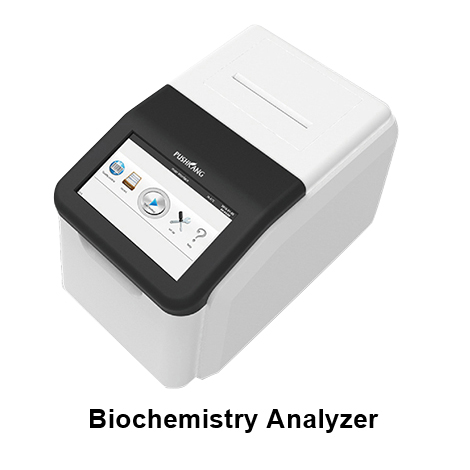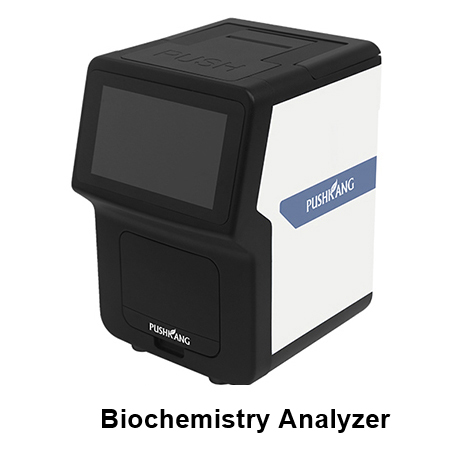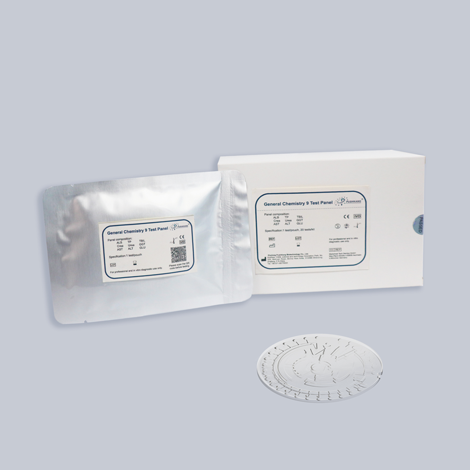-

Chemistry Analyzer MS100
MoreIntended use
Chemistry Analyzer MS100 is used for the quantitative analysis of analytes in human samples. This instrument is suitable for laboratories with professional testing capabilities in medical institutions, such as central laboratories, outpatient and emergency laboratories, clinical departments, physical examination centers, etc. For in vitro diagnostic use only.
Advantages
1. Whole blood sampling
It is commonly used in point-of-care testing and emergency situations where quick results are required.
2. Internal centrifuge
This saves time and reduces the risk of sample contamination.
3. Free combination of lyophilized discs
The lyophilized discs has a flexible combination method, which can be freely combined according to actual needs and research purposes.
4. Instrument miniaturization, lyophilized reagent pre-packaged design
Efficient use of reagents, minimizing waste and reducing overall testing costs
Easy to ship and valid for 12 months
5. Fast, accurate and portable
The analyzer was designed to be portable and have a small footprint, ensuring that it can be used anywhere at any time.
Cat No.HE10005
-

Automated Chemistry Analyzer MS200
MoreDescription
MS200 Automated Chemistry Analyzer is an instrument for in vitro detection of clinical biochemical items in human. Full automatic operation, no need to add diluent and centrifuge. Only 3-step quick and easy operation leads to result.
Advantages
> The instrument is intelligent and easy to operate
Only 3 steps, users can quickly get started and understand how to operate.
> Standard addition, automatic dilution
The instrument is equipped with advanced automation features, such as automatic diluent addition and automatic quantitative addition.
> Disc chip, long-term storage
Disc chips can be designed for specific assays, or they can be multifunctional, allowing different types of tests to be performed on the same platform.
-

Biochemistry Test Panel
MoreChemistry tests are a group of routine tests designed to determine a person’s general health. For example, they help to assess the body’s electrolyte balance and/or the status of several major body organs. These tests are performed on a sample of blood, usually drawn from a vein.
Intended use
Biochemical test panels can help doctors in the early detection and screening of diseases.
It plays an important role in the process of disease diagnosis, monitoring and treatment, providing doctors with a fast, efficient and comprehensive method to analyze the biochemical status of patients.
Biochemical test panels can also be used to assess the efficacy of specific drugs and monitor the course of treatment.Some of the number and types of tests included in specific groups, as well as group names, have been standardized across the country. Examples of common chemistry panels include:
General Chemistry 9 Test Panel
General Chemistry 13 Test Panel
General Chemistry 19 Test Panel
Emergency Room 13 Test Panel
Electrolyte 4 Test Panel
Electrolyte 7 Test Panel
- – helpful for detecting a problem with the body’s fluid and electrolyte balance
Liver Function Panel Test
- – used to screen for, detect, evaluate, and monitor acute and chronic liver inflammation (hepatitis), liver disease and/or damage
Glucose and Lipid Panel Test
Renal Function Panel Test
– contains tests such as albumin, creatinine, BUN, eGFR to evaluate kidney function
Myocardial Enzyme Panel Test




